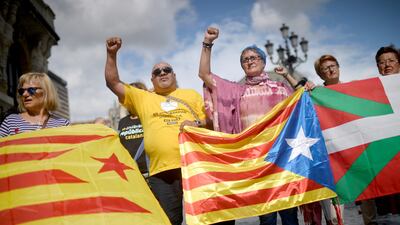As more than a million people prepare to celebrate the National Day of Catalonia on Monday, the Spanish government continues to sweat over the schism facing the country.
The day-long festival, known as the Diada, sees nationalists lay flowers at monuments of their heroes and patriotic demonstrations are held throughout the area’s cities, towns and villages.
Last year, an estimated 1.2m people flooded their local streets to proudly wave their senyeres and estelades and show support.
This year, these demonstrations will come just days after pro-independence groups protested outside the offices of the few mayors across Catalonia who have announced they will not allow municipal spaces to be used for the upcoming referendum.
This injection of Catalonian pride could not be coming at a worse time for Prime Minister Mariano Rajoy, who is in the process of trying to quash a vote which some fear could enflame public discord to mirror those seen at the start of the Ukrainian revolution in 2014.
On Wednesday, Catalonia’s parliament voted to hold an independence referendum on October 1st. Madrid has since declared the referendum - which could see the wealthy autonomous community separate from the rest of Spain - illegal.
Voters will be asked: “Do you want Catalonia to be an independent country in the form of a republic?”
Although polls suggest the referendum result will play in the Spanish government’s favour, the majority of Catalans want the opportunity to vote on the matter.
________________
Read more
Catalonia set for independence vote in October
Spotlight on Catalonia's independence vote as Spain grapples with terrorist attacks
________________
Despite the legal block on the vote, many of the region’s 1,000 mayors have pledged to facilitate the vote and Barcelona’s mayor Ada Colau has sought assurances that municipal staff will not face legal action or lose their jobs if they help to organise the vote.
Having originally offered to allow premises across the city to be used as polling stations, Ms Colau has asked the Catalan government for further reassurances that civil servants involved would be protected, her office said.
“We support the right to participate and protest completely but we will repeat what we have said many times before: we will not put at risk institutions or civil servants,” Barcelona’s deputy mayor, Gerardo Pisarello, said on Friday.
In a video posted on Twitter, the mayor of the Cerdanyola municipality tore in half a letter from the Constitutional Court warning of the legal repercussions of participating in the referendum to applause from the crowd watching.
This is not the first time such a vote has been attempted in the autonomous region.
Artur Mas, the former leader of Catalonia, was banned earlier this year from holding public office for two years, after being found guilty of disobeying a Spanish court when his government staged a non-binding independence vote in Catalonia in 2014. He was fined 36,500 euros (Dh161,350)
The non-binding 2014 vote saw just under 40% turn out, but of those who voted, 80% did so in favour of independence. Despite being declared illegal, Catalonia’s government has promised that the referendum will be binding.
Ballot papers are reportedly hidden across Catalonia and today Spanish police searched the offices of a weekly newspaper in the town of Valls in search of ballot papers, according to local press. Yesterday, the Civil Guard police searched a printing company near Tarragona, reportedly in search of materials to be used in the independence vote, reports Reuters.
Spain’s Civil Guard police was unavailable for comment but a court statement said the searches were related to charges brought by the public prosecutor in relation to the referendum.
“This has gotten out of control,” Javier Solana, Spain’s former foreign minister and a former secretary-general of NATO said to The New York Times. “We’re no longer in a normal situation of political conflict, where the politicians fight but at least respect the rules of the game.”
Adding to the uncertainty of the situation, experts and politicians seem unable to judge what impact, if any, the terror attacks which struck the Catalonia capital of Barcelona and nearby Cambrils in August.
The senseless violence initially united those who are strongly pro-independence, pro-unity and everything in between. But as life began to return to normal, the tensions rose to the surface once again as politicians on either side began to squabble and point fingers of blame over security weak spots.

